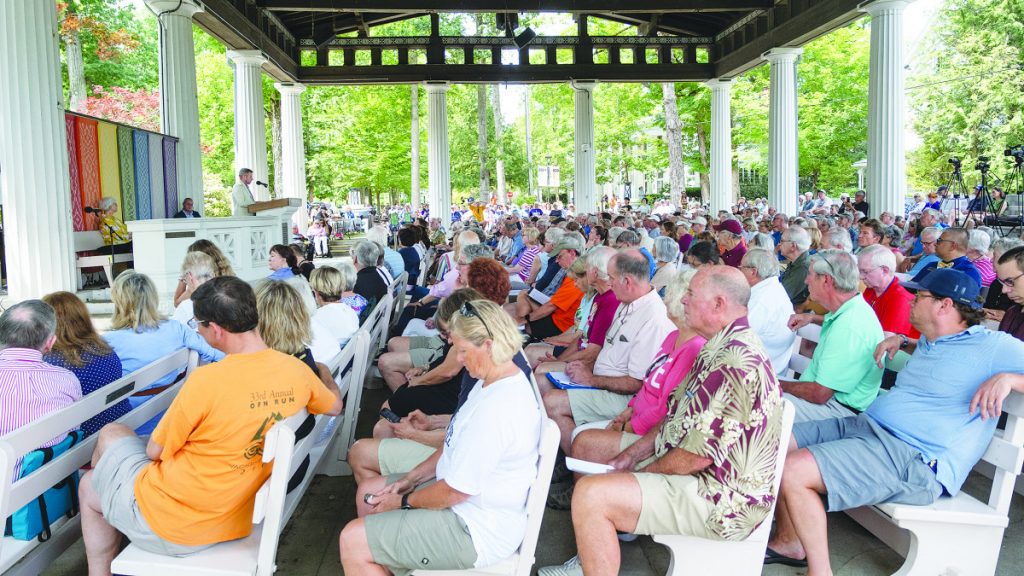
Alton Northup
Staff writer
“The Institution is on sound financial footing,” assured Chautauqua Institution President Michael E. Hill at the July 15, 2023, Institution Leadership Forum following the Chautauqua Property Owners Association General Meeting.
The forum, held in the Hall of Philosophy, largely focused on the Institution’s budgeting and financial planning, and came 11 days after announced cuts to Chautauqua Opera Company and Conservatory funding, and five days after a town hall meeting that drew a capacity crowd of Chautauquans, students and faculty July 10, 2023, to Elizabeth S. Lenna Hall to express deep concerns and support of the program. Saturday’s forum was likewise heavily attended.
In advance of Saturday’s forum, Hill sent a letter to Chautauquans on Friday detailing the finances and reasoning for the cuts, which served as a guide to his comments.
In the memo, Hill noted the Institution started the 2023 season with $10.5 million in cash reserves — which he attributed to strong pre-pandemic years — which is about 20% of the annual operating budget. He called the 2022 season “disappointing” and broke down a $6.6 million increase in expenses from 2019 to 2022.
“We’ve been on a three-year journey through this COVID period,” Hill said at the forum. “We had hoped that last year we would be able to emerge fully from our pre-COVID conditions, and certainly that was not the case.”
In response to the deficit, and an unpredictable post-pandemic economy, the Chautauqua Institution Board of Trustees requested the Institution’s leadership team make a three-year budget plan. Immediate changes for the 2023 season were one less mainstage production for theater and opera, a pause on the School of Arts while a new artistic director is brought on board, a hiring freeze for selected positions outside program areas, reduced seasonal staff housing, reduced CHQ Assembly budget, eliminating raises for executive staff and reduced operating expenses across all departments.
The Institution anticipates closing a $3.54 million gap in 2024, based on estimates, through $200,000 in new earned revenue, $1.4 million in new philanthropy, $1.2 million in reductions outside of programming and $700,000 in reductions to programming — where the opera reductions fall. Still, projections show the Institution will need to reconcile an additional $500,000 in 2025.
The bulk of programming reductions ahead of 2024 come from a 70% cut to Chautauqua Opera Company and Conservatory funding. As part of these cuts, the nation’s fourth-oldest opera company will instead focus on new American workshops, still under the direction of General and Artistic Director Steven Osgood, and will hold no major performances in Norton Hall.
The decision to make cuts to the opera program were based on the financial impact of the highest subsidy programs, Hill and other executive staff shared at the July 10 meeting. In 2019, the best year on record for the Institution, opera brought in $99,047 in revenue from 2,856 tickets. Those figures — as all attendance figures did — dipped in 2022, with 1,761 tickets bringing in $77,536. Likewise, the Conservatory saw a decrease of $388,331 in revenue from 17,241 tickets in 2019 to $287,307.99 from 9,239 tickets in 2022.
“We’re charged with overseeing the Institution’s strategy and that means ensuring that the choices that are being made are aligned with our mission and our vision, that the strategies are informed by sound data and information and that our work is shaped and modified in review of both internal forces, but as importantly, external forces,” Candace Maxwell, chair of the board of trustees, said on Saturday.
Those external forces, Hill said, are affecting many cultural institutions. In 2022, the Metropolitan Opera announced it would withdraw $30 million from its endowment, give fewer performances and stage more contemporary shows, or new works. On July 13, the Public Theater laid off 19% of its staff amid a 30% decline in attendance, according to The New York Times.
“Chautauqua has always wrestled with change when it bumps up against tradition, but like cultural institutions across the country, we know that we need to continue to adapt for this era of Chautauqua,” he said.




